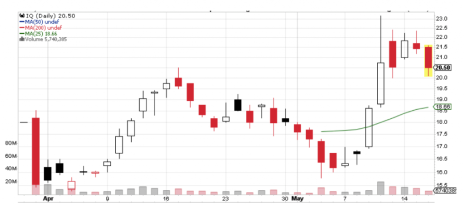In yesterday’s Wall Street’s Best Daily, I gave you the first two lessons on how to deal with Chinese IPOs. (The lessons apply to any IPOs, of course, but since China is my beat, I tend to focus on it.)
Today, I’m delivering the third lesson, and to do that I’m using an example of a Chinese company called iQIYI (IQ), that’s aiming to become something like the Netflix (NFLX) of China.
While there are dozens of companies in China that have mastered the internet, iQIYI (it’s pronounced ee-chee-yee and translates to “love fantastic art”) is focused on using its online video platform to stream its own premium content as well as content provided by its distribution partners.
iQIYI makes money from online advertising (47% of 2017 revenue), membership services like premium content subscriptions (38%), content distribution (7%) and the rest from various sources.
The company has yet to turn a profit, but it grew revenue by 104% in 2016, 56% in 2017 and 63% in Q1 2018. Even a company that has been averaging 126 million mobile daily users (DAU) and has had a number of internet hits with its original content can’t go on forever without making money.
[text_ad use_post='129628']
That’s why it’s very important that the company is a subsidiary of Baidu (BIDU), which has been footing the bill for its development and rollout. Baidu’s massive user base is also the reason behind iQIYI’s rapid growth, and there have been several previous companies that tried to dominate online streaming video but lacked the huge corporate sponsor. They mostly fell by the wayside or were gobbled up by other internet giants. But Baidu’s sponsorship and support should give iQIYI a solid chance to make it.
IQ came public at the end of March at around 18. The IPO realized more than $2 billion, which will also enable the production of great original content.
Here’s what the daily chart for IQ looks like.
You can see the stock’s open at 18, its dip to 15.5 the following day and its recovery to 20 in the middle of April. Then comes a three-week dip back to support at 16 and another rally that lifts the stock briefly to as high as 23 before it relaxes to support at 20 again.
Not to belabor the obvious, but IQ is a very young stock. The three-week pullback in April and May might be the post-IPO correction I talked about yesterday or it might not. IQ picked up a 25-day moving average on May 3, and the stock has stayed above that average since May 9. But all of these moves are mostly just noise, and may mean nothing. In order to establish a real trend in a stock, you need at least enough history to include a 50-day moving average.
So that leads me to the third of my lessons on how to handle Chinese IPOs.
The Third Lesson on Chinese IPOs: Be Patient!
Remember that IPOs are volatile and that they generally have minimal sponsorship by institutional investors. That means that the potential for growth is virtually limitless, as a stock that finds favor with the whales can run for a long time.
Accordingly, you don’t have to take a chance by jumping in early to achieve great returns. Waiting for the company’s next quarterly earnings report (iQIYI reported its Q1 results on April 26) will give you a better read on the company’s progress toward profitability and its ability to exceed analysts’ expectations.
I have iQIYI on the watch list for Cabot Global Stocks Explorer, and I plan to follow it closely for as long as it takes to get a handle on the company’s real potential. I know I’m early, but the story is an attractive one, so I’m prepared to follow the Third Lesson and be as patient as necessary.
I hope you do the same.
[author_ad]

